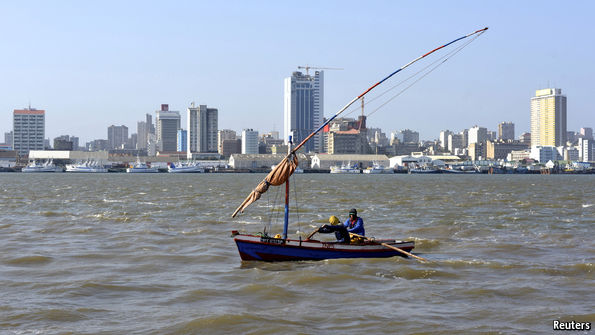Who calls the tuna?
Mozambique is floundering amid corruption and conflict

A DECISION this week by Moody’s, a ratings agency, to downgrade Mozambique from a lowly B2 to a dismal B3 has cast a pall over one of the world’s poorest countries. What makes the picture glummer still is that only a few years ago a much-heralded bonanza of offshore gas had made Mozambique one of Africa’s favoured recipients of foreign investment.
No longer. A scandal has mired the country and its government in the reek of incompetence and corruption. Two-and-a-half years ago, Credit Suisse raised $500m on behalf of Empresa Mocambicana de Atum (EMATUM), a newly created state-owned tuna-fishing company. A Russian bank, VTB, raised another $350m. The cash was supposed to pay mainly for a fleet of fishing boats. Instead, it was diverted into an array of other purchases, including security equipment. The company said it hoped to catch 200,000 tonnes of tuna a year, but is catching barely any fish at all. A rescue plan has been proposed, involving the issuing of a new government bond.
Explaining its decision, Moody’s notes Mozambique’s “deteriorating balance of payments position and reduced capacity for the government to service its outstanding debt”, and pours doubt on the plan to rescue EMATUM. which “remains in a precarious financial position”. Meanwhile, the word among businesspeople in Maputo, Mozambique’s capital, is that the three main companies involved in the biggest gas projects—Anadarko from Texas, Italy’s ENI and South Africa’s Sasol—do not expect the gas to start flowing fully until 2023. So the fruits of the hoped-for bonanza, which might have been expected to boost Mozambique’s miserable ranking in the UN’s latest human development index (180th out of 188), are some way off.
Explaining its decision, Moody’s notes Mozambique’s “deteriorating balance of payments position and reduced capacity for the government to service its outstanding debt”, and pours doubt on the plan to rescue EMATUM. which “remains in a precarious financial position”. Meanwhile, the word among businesspeople in Maputo, Mozambique’s capital, is that the three main companies involved in the biggest gas projects—Anadarko from Texas, Italy’s ENI and South Africa’s Sasol—do not expect the gas to start flowing fully until 2023. So the fruits of the hoped-for bonanza, which might have been expected to boost Mozambique’s miserable ranking in the UN’s latest human development index (180th out of 188), are some way off.
The political mood has turned steadily more poisonous since the presidential election of October 2014, which was won by Filipe Nyusi, the candidate of Frelimo, the party that has ruled since independence in 1975. In a poll that the opposition said was unfair, he officially won 57% of the vote, against 37% for Afonso Dhlakama, who has led the Renamo party, often as a rebel guerrilla force, for more than three decades. Mr Dhlakama indisputably won three provinces in the centre and north, out of the ten nationwide, including one whose coastline abuts some of the biggest gasfields. On three occasions late last year, unknown gunmen presumed to have ties to the security forces have attacked him, forcing him to flee to his stronghold in the bush. Since then, the number violent incidents across the north of the country, where he is widely supported, have mounted. Thousands of civilians have fled to neighbouring Malawi.
It is thought that Mr Nyusi, the country’s first president not to have been a veteran of the liberation struggle against Portugal, has tried to seek an accommodation with Mr Dhlakama, and to tackle the old-guard corruption epitomised by the EMATUM scandal. But the military men and old party bigwigs close to Armando Guebuza, the president who stepped down a year ago and who signed off on the original EMATUM deal, still retain much influence—and may well favour a more ruthless course against Mr Dhlakama, including a so-called “Savimbi solution”.
This harks back to the end of the civil war in Angola, Mozambique’s ex-Portuguese sister country on the west side of the continent, when Jonas Savimbi, a longstanding opposition leader there, was killed by government forces in 2002. Since then, stability (albeit tarnished by grand corruption), has prevailed. A recent exchange of cosy ministerial visits between Mozambique and Angola may suggest that such ideas are being aired. But if it somehow got rid off Mr Dhlakama, the ruling party might find it even harder to find an interlocutor within Renamo to secure a lasting peace deal. And without peace, foreign investors are likely to shy away—even if scandals such as EMATUM cease.
The Economist
The Economist
























No comments:
Post a Comment